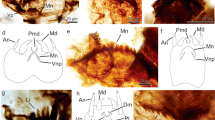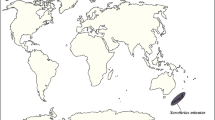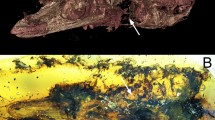Abstract
RECENTLY, while continuing the search for additional Lower Miocene fossil fruits and seeds in the deposits on Rusinga and M'fwangano Islands in Lake Victoria, in order to obtain more data concerning the environmental conditions under which the Miocene ape Proconsul lived, we have found some remarkable fossils of insects and other soft-bodied invertebrates. This discovery is of unusual interest, not only because it is believed to be the first of its kind in Africa, but also because of the very unusual state of preservation of the material. Most fossil insect remains—other than those preserved in Oligocene ambers—have been found in a somewhat crushed and distorted condition in laminated rocks. In the present case the fossils, in spite of their soft-bodied nature during life, have retained their natural shape in a quite surprising manner. This is clearly shown in the accompanying illustrations of a lepid-opterous larva (Fig. 1) and a pedipalpid (Fig. 2).
This is a preview of subscription content, access via your institution
Access options
Subscribe to this journal
Receive 51 print issues and online access
$199.00 per year
only $3.90 per issue
Buy this article
- Purchase on Springer Link
- Instant access to full article PDF
Prices may be subject to local taxes which are calculated during checkout
Similar content being viewed by others
Author information
Authors and Affiliations
Rights and permissions
About this article
Cite this article
LEAKEY, L. Lower Miocene Invertebrates from Kenya. Nature 169, 624–625 (1952). https://doi.org/10.1038/169624b0
Issue Date:
DOI: https://doi.org/10.1038/169624b0
Comments
By submitting a comment you agree to abide by our Terms and Community Guidelines. If you find something abusive or that does not comply with our terms or guidelines please flag it as inappropriate.



